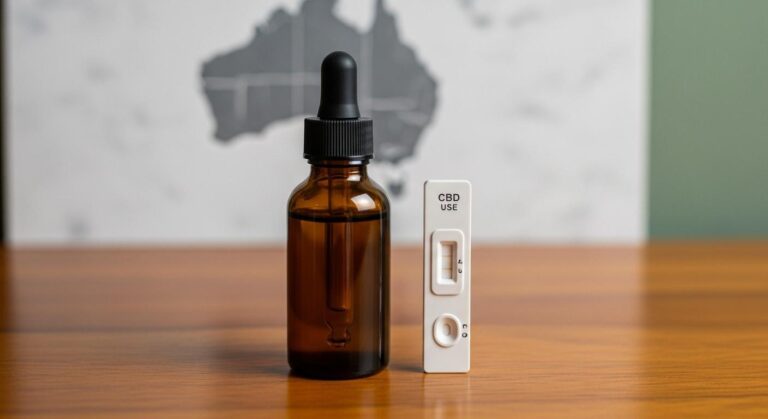Contents
- 1 Understanding CBD and THC: Key Differences
- 2 How Drug Tests Work
- 3 The Science Behind CBD Detection in Drug Tests
- 4 Legal Considerations for CBD Use in Australia
- 5 Potential Risk Factors and Misunderstandings
- 6 Safe Practices for CBD Consumers in Australia
- 7 Alternatives and Precautions
- 8 What to Do If You Fail a Drug Test Unexpectedly
Understanding CBD and THC: Key Differences
Ah, the world of cannabis—where the plants are green and the legal jargon is as thick as a Queensland rainforest. At the heart of this leafy conundrum are CBD (cannabidiol) and THC (tetrahydrocannabinol). While they both hail from the cannabis plant, they’re as different as Vegemite and jam. THC is the one you’ve heard about at parties, offering a ticket to euphoria and the odd urge to philosophize about lawn grass. It’s psychoactive, meaning it can change your mental state, often leading to intoxication. On the flip side, CBD is more of a wallflower, devoid of the psychoactive effects that make THC notorious. In Australia, THC’s presence is regulated like a secret club, while CBD enjoys a legal status if it contains less than 0.3% THC.
These cannabinoids have their own fan clubs. CBD is celebrated for its potential medical benefits—think stress relief and pain management without the high. THC, meanwhile, is sometimes prescribed for conditions that benefit from its psychoactive effects, like certain chronic pain conditions. The key is knowing what you’re getting and why, particularly when it comes to drug testing.
How Drug Tests Work
If you’ve ever had to take a drug test, you know it’s not as glamorous as a Hollywood heist film. More like a rendezvous with a plastic cup. Drug tests, especially the dreaded urine test, are designed to detect specific substances or their metabolites—the chemical remnants that linger on like the scent of garlic after a meal. In Australia, these tests are often employed for workplace drug testing, ensuring employees remain sharp as a kangaroo’s jump.
Tests vary: urine, blood, hair, and saliva. Most focus on THC or its metabolites, mainly because they’re psychoactive. CBD, without its intoxicating punch, isn’t usually on the radar of a drug test. But, like that one time your brother borrowed your car without asking, surprises do happen.
The Science Behind CBD Detection in Drug Tests
Here’s where the chemistry gets chewy. CBD and THC may both be cannabinoids, but they have different structures. It’s the THC metabolites that drug tests are interested in. Still, if you’re enjoying full-spectrum CBD products, there’s a slim chance you might get more than you bargained for—trace amounts of THC can be present, leading to a possible positive result. Cross-contamination during production can also throw a spanner in the works.
Anecdotal reports of positive drug test results from CBD users often stem from the use of products that aren’t as pure as sunshine. Product labeling can be as deceptive as a magician’s sleight of hand—what you see isn’t always what you get.
Legal Considerations for CBD Use in Australia
Australia’s stance on CBD is like a cautious embrace. Yes, you can use CBD, but only if it contains less than 0.3% THC, and preferably through legally permissible avenues, such as a medical prescription. Over-the-counter sales have made things more accessible, but it’s critical to keep an eye on the labeling like you would on a wandering toddler.
Understanding product content isn’t just a good idea; it’s essential. You don’t want to face an awkward chat with your boss over a positive drug test result because of mislabeled CBD oil.
Potential Risk Factors and Misunderstandings
Misconceptions about CBD products abound like seagulls at a picnic. Some think that because CBD isn’t psychoactive, it can’t possibly cause a positive drug test. Others get tripped up by mislabeled products that boast of being THC-free but haven’t met Australian standards. Take, for example, the curious case of an athlete who trusted a non-regulated CBD product and found himself having an unexpected chat with his sports board about a positive test.
Inaccurate THC levels in products can lead to false positives. It’s akin to ordering a no-sugar drink and feeling the sugar rush kick in anyway.
Safe Practices for CBD Consumers in Australia
Navigating CBD use while avoiding a drug test mishap requires a bit more than blind faith. Start by choosing CBD products from reputable brands known for quality and stringent testing. Take a good look at lab reports—think of them as the report card for your CBD product. Ensure the THC content is within permissible limits.
Knowing whether you’re using a CBD isolate (purest form) or a product containing other cannabinoids can save you from unexpected conversations at work about your ‘recreational activities’.
Alternatives and Precautions
For those facing regular drug testing, sticking to CBD isolate products is often the safest bet. Still, if you’re leaning towards full or broad-spectrum products, be ready to discuss why you smell like a health store with your HR department. Precaution is crucial; reading labels, verifying sources, and understanding what’s in the bottle can prevent hiccups down the line.
What to Do If You Fail a Drug Test Unexpectedly
Finding yourself at the center of a positive drug test result can feel as shocking as a surprise thunderstorm on a sunny day. If you suspect your CBD use is the culprit, don’t panic. Reviewing the product information and understanding the circumstances surrounding your test results can provide a clearer picture. It’s your right to question the results and request a retest or validation.
Communicating openly with employers while being informed about your rights under Australian law can help mitigate the situation. Legal advice might be a good companion here, guiding you through proving your case and justifying your CBD use, particularly if it’s medically prescribed.



